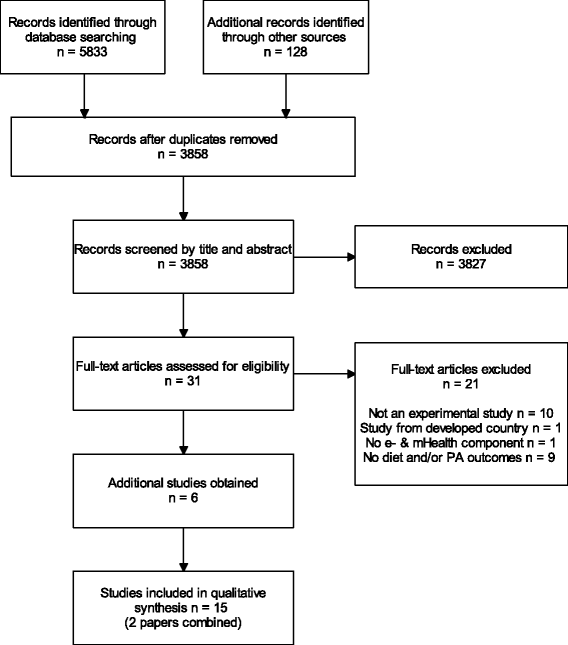The effectiveness of e-& mHealth interventions to promote physical activity and healthy diets in developing countries: A systematic review
- PMID: 27724911
- PMCID: PMC5057225
- DOI: 10.1186/s12966-016-0434-2
The effectiveness of e-& mHealth interventions to promote physical activity and healthy diets in developing countries: A systematic review
Abstract
Background: Promoting physical activity and healthy eating is important to combat the unprecedented rise in NCDs in many developing countries. Using modern information-and communication technologies to deliver physical activity and diet interventions is particularly promising considering the increased proliferation of such technologies in many developing countries. The objective of this systematic review is to investigate the effectiveness of e-& mHealth interventions to promote physical activity and healthy diets in developing countries.
Methods: Major databases and grey literature sources were searched to retrieve studies that quantitatively examined the effectiveness of e-& mHealth interventions on physical activity and diet outcomes in developing countries. Additional studies were retrieved through citation alerts and scientific social media allowing study inclusion until August 2016. The CONSORT checklist was used to assess the risk of bias of the included studies.
Results: A total of 15 studies conducted in 13 developing countries in Europe, Africa, Latin-and South America and Asia were included in the review. The majority of studies enrolled adults who were healthy or at risk of diabetes or hypertension. The average intervention length was 6.4 months, and text messages and the Internet were the most frequently used intervention delivery channels. Risk of bias across the studies was moderate (55.7 % of the criteria fulfilled). Eleven studies reported significant positive effects of an e-& mHealth intervention on physical activity and/or diet behaviour. Respectively, 50 % and 70 % of the interventions were effective in promoting physical activity and healthy diets.
Conclusions: The majority of studies demonstrated that e-& mHealth interventions were effective in promoting physical activity and healthy diets in developing countries. Future interventions should use more rigorous study designs, investigate the cost-effectiveness and reach of interventions, and focus on emerging technologies, such as smart phone apps and wearable activity trackers.
Trial registration: The review protocol can be retrieved from the PROSPERO database (Registration ID: CRD42015029240 ).
Keywords: Developing countries; Dietary transition; Exercise; Healthy eating; ICT; Mobile phone; NCDs; Technology; Web-based.
Figures
References
-
- World Health Organization . Global status report on noncommunicable diseases 2014. Geneva: World Health Organization; 2014.
-
- Lozano R, Naghavi M, Foreman K, Lim S, Shibuya K, Aboyans V, et al. Global and regional mortality from 235 causes of death for 20 age groups in 1990 and 2010: A systematic analysis for the Global Burden of Disease Study 2010. Lancet. 2012;380(9859):2095–2128. doi: 10.1016/S0140-6736(12)61728-0. - DOI - PMC - PubMed
Publication types
MeSH terms
LinkOut - more resources
Full Text Sources
Other Literature Sources
Medical


